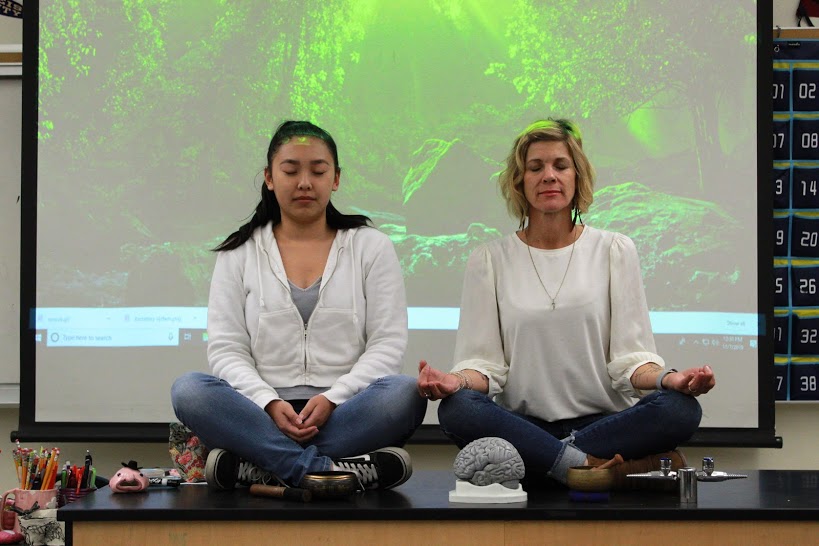
By Haneen Bany-Mohammed, Staff Writer
The practice of mindfulness in schools was a push made by the Orange County Department of Education (OCDE) due to rising despression and suicide rates. Not only have teachers been implementing mindfulness in their classes to help out students, but a group of teenagers here on campus also noticed how beneficial and needed mindfulness was, so they formed the “Mindfulness Club.”
According to John Kabat Zin (“the father of mindfulness), ¨mindfulness means paying attention in a particular way, on purpose, in the present moment, and non – judgementally.”
Through mindfulness, we are able to rewire our brains so that we are more aware of our body’s response to stress.
“We are so in our heads [that] we don’t notice the amazing blue sky and the cool shapes of the clouds, or people with whom we could connect with, or the flowers, or the smell of coffee …. these things, the little things that happen in the present moment, are the things that truly make us happy, those unnoticed moments become magic when we pay attention,” says Mrs. Barro, advisor of Mindfulness Club.
When we are stressed, our body and mind react the same way to an upcoming presentation as it would to running away from a grizzly bear. This is due to the course of human evolution. In what is known as the ¨fight-or-flight¨ reponse, our ancestors, when faced with a grizzly bear, would either fight it or run away from it. They relied on the flight or fight response to survive. Today, we still have this ¨fight-or-flight¨ response, but in our fast paced high demand environment, it will show up to anything it perceives as a threat, in many familiar places like having a conversation with a crush or taking a Spanish quiz.
Once we observe the present moment through mindfulness, we realize that our body is simply ¨fighting-or-flighting¨ in response to a perceived threat. This is liberating because it shows us that there is no actual threat, and that we just need to accept how our body is responding.
In addition to bringing awareness to our body’s responses, mindfulness retrains the brain to be able to recognize emotions when they are happening and to step back from them, pause, and realize we are not them.
“We can feel angry, but we are not anger. Anger is a feeling that is separate from who we really are,” Barro says, “like the weather, our emotions are temporary.”
Inspired by Mrs. Barro, Senior Cynthiana Vuong, President of Mindfulness Club, performs mindful-based activities during their meetings such as writing a gratitude note, creating paper tigers, or watching a video. They always have an additional ten minutes of breathing afterwards.
¨We want students to join to take care of themselves and learn a good way to cope. People usually cope with unhealthy distractions like drugs, self harm, alcohol, and etc. we want to show a better way to cope: mindfully breathing,¨ says Vuong.
Mindful breathing is proven to engage our human nervous system to trigger the relaxation response, a response known as the opposite of the ¨fight-or-flight.¨
During Mindfulness´ first year as a club, they have already taught important concepts such as the acronym R.A.I.N. (Recognize a situation, Accept it as it is, Investigate where it is coming from, and Non-attachment to the situation), mindful eating and breathing techniques.
¨We plan on teaching more about stress, body scans, defeating negativity, loving kindness, and even more,¨ says Vuong.
Hoping to help people and provide support, Mindfulness Club takes place during room 223 on Wednesdays. They can also be found on instagram @carebarons, where they frequently post tips on mindful living and self care.





